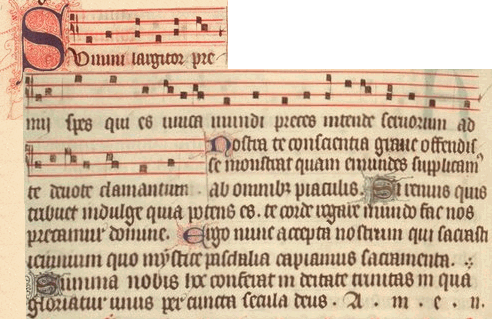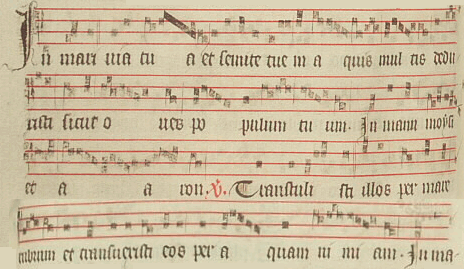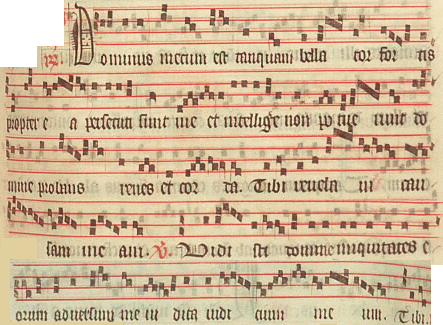READINGS: LENT SATURDAY I

Invitatory Psalm & BACK

Psalm 105: Hebrew English Then BACK
ὁ δὲ ποιῶν τὴν ἀλήθειαν ἔρχεται πρὸς τὸ φῶς, — ἵνα φανερωθῇ αὐτοῦ τὰ ἔργα.
Even Years: Exodus 12:37-49; 13:11-16 וַיִּסְעוּ בְנֵי־יִשְׂרָאֵל מֵרַעְמְסֵס סֻכֹּתָה כְּשֵׁשׁ־מֵאוֹת אֶלֶף רַגְלִי הַגְּבָרִים לְבַד מִטָּף׃ וְגַם־עֵרֶב רַב עָלָה אִתָּם וְצֹאן וּבָקָר מִקְנֶה כָּבֵד מְאֹד׃ וַיֹּאפוּ אֶת־הַבָּצֵק אֲשֶׁר הוֹצִיאוּ מִמִּצְרַיִם עֻגֹת מַצּוֹת כִּי לֹא חָמֵץ כִּי־גֹרְשׁוּ מִמִּצְרַיִם וְלֹא יָכְלוּ לְהִתְמַהְמֵהַּ וְגַם־צֵדָה לֹא־עָשׂוּ לָהֶם׃ וּמוֹשַׁב בְּנֵי יִשְׂרָאֵל אֲשֶׁר יָשְׁבוּ בְּמִצְרָיִם שְׁלֹשִׁים שָׁנָה וְאַרְבַּע מֵאוֹת שָׁנָה׃ וַיְהִי מִקֵּץ שְׁלֹשִׁים שָׁנָה וְאַרְבַּע מֵאוֹת שָׁנָה וַיְהִי בְּעֶצֶם הַיּוֹם הַזֶּה יָצְאוּ כָּל־צִבְאוֹת יְהוָה מֵאֶרֶץ מִצְרָיִם׃ לֵיל שִׁמֻּרִים הוּא לַיהוָה לְהוֹצִיאָם מֵאֶרֶץ מִצְרָיִם הוּא־הַלַּיְלָה הַזֶּה לַיהוָה שִׁמֻּרִים לְכָל־בְּנֵי יִשְׂרָאֵל לְדֹרֹתָם׃ וַיֹּאמֶר יְהוָה אֶל־מֹשֶׁה וְאַהֲרֹן זֹאת חֻקַּת הַפָּסַח כָּל־בֶּן־נֵכָר לֹא־יֹאכַל בּוֹ׃ וְכָל־עֶבֶד אִישׁ מִקְנַת־כָּסֶף וּמַלְתָּה אֹתוֹ אָז יֹאכַל בּוֹ׃ תּוֹשָׁב וְשָׂכִיר לֹא־יֹאכַל־בּוֹ׃ בְּבַיִת אֶחָד יֵאָכֵל לֹא־תוֹצִיא מִן־הַבַּיִת מִן־הַבָּשָׂר חוּצָה וְעֶצֶם לֹא תִשְׁבְּרוּ־בוֹ׃ כָּל־עֲדַת יִשְׂרָאֵל יַעֲשׂוּ אֹתוֹ׃ וְכִי־יָגוּר אִתְּךָ גֵּר וְעָשָׂה פֶסַח לַיהוָה הִמּוֹל לוֹ כָל־זָכָר וְאָז יִקְרַב לַעֲשֹׂתוֹ וְהָיָה כְּאֶזְרַח הָאָרֶץ וְכָל־עָרֵל לֹא־יֹאכַל בּוֹ׃ תּוֹרָה אַחַת יִהְיֶה לָאֶזְרָח וְלַגֵּר הַגָּר בְּתוֹכְכֶם׃ וְהָיָה
כִּי־יְבִאֲךָ
יְהוָה
אֶל־אֶרֶץ הַכְּנַעֲנִי
כַּאֲשֶׁר
נִשְׁבַּע
לְךָ וְלַאֲבֹתֶיךָ
וּנְתָנָהּ
לָךְ׃
וְהָיָה כִּי־יִשְׁאָלְךָ בִנְךָ מָחָר לֵאמֹר מַה־זֹּאת וְאָמַרְתָּ אֵלָיו בְּחֹזֶק יָד הוֹצִיאָנוּ יְהוָה מִמִּצְרַיִם מִבֵּית עֲבָדִים׃ וַיְהִי כִּי־הִקְשָׁה פַרְעֹה לְשַׁלְּחֵנוּ וַיַּהֲרֹג יְהֹוָה כָּל־בְּכוֹר בְּאֶרֶץ מִצְרַיִם מִבְּכֹר אָדָם וְעַד־בְּכוֹר בְּהֵמָה עַל־כֵּן אֲנִי זֹבֵחַ לַיהוָה כָּל־פֶּטֶר רֶחֶם הַזְּכָרִים וְכָל־בְּכוֹר בָּנַי אֶפְדֶּה׃ וְהָיָה לְאוֹת עַל־יָדְכָה וּלְטוֹטָפֹת בֵּין עֵינֶיךָ כִּי בְּחֹזֶק יָד הוֹצִיאָנוּ יְהוָה מִמִּצְרָיִם׃ 37 The Israelites left Rameses for Succoth, about six hundred thousand on the march-men, that is, not counting their families. 38 A mixed crowd of people went with them, and flocks and herds, quantities of livestock. 39 And with the dough which they had brought from Egypt they baked unleavened cakes, because the dough had not risen, since they had been driven out of Egypt without time to linger or to prepare food for themselves. 40 The time that the Israelites spent in Egypt was four hundred and thirty years. 41 And on the very day the four hundred and thirty years ended, all Yahweh's armies left Egypt. 42 The night when Yahweh kept vigil to bring them out of Egypt must be kept as a vigil in honour of Yahweh by all Israelites, for all generations. 43 Yahweh said to Moses and Aaron, 'This is the ritual for the Passover: no alien may eat it, 44 but any slave bought for money may eat it, once you have circumcised him. 45 No stranger and no hired servant may eat it. 46 It must be eaten in one house alone; you will not take any of the meat out of the house; nor may you break any of its bones. 47 The whole community of Israel must keep it. 48 Should a stranger residing with you wish to keep the Passover in honour of Yahweh, all the males of his household must be circumcised: he will then be allowed to keep it and will count as a citizen of the country. But no uncircumcised person may eat it. 49 The same law will apply to the citizen and the stranger resident among you... 13:11 When Yahweh has brought you into the Canaanites' country, as he swore to you and your ancestors that he would, and given it to you, 12 to Yahweh you must make over whatever first issues from the womb, and every first-born cast by animals belonging to you: these males belong to Yahweh. 13 But every first-born donkey you will redeem with a lamb or kid; if you do not redeem it, you must break its neck. All the human first-born, however, among your sons, you will redeem. 14 And when your son asks you in days to come, "What does this mean?" you will tell him, "By the strength of his hand Yahweh brought us out of Egypt, out of the place of slave-labour. 15 When Pharaoh stubbornly refused to let us go, Yahweh killed all the first-born in Egypt, of man and beast alike. This is why I sacrifice every male first issuing from the womb to Yahweh and redeem every first-born of my sons." 16 This will serve as a sign on your hand would serve, or a headband on your forehead, for by the strength of his hand Yahweh brought us out of Egypt.' Even Years: Deuteronomy 16:1-17 1 שָׁמוֹר
אֶת־חֹדֶשׁ
הָאָבִיב
וְעָשִׂיתָ פֶּסַח
לַיהוָה
אֱלֹהֶיךָ
כִּי
בְּחֹדֶשׁ הָאָבִיב
הוֹצִיאֲךָ
יְהוָה
אֱלֹהֶיךָ מִמִּצְרַיִם
לָיְלָה׃
1 Observe the month of Abib and celebrate the Passover for Yahweh your God, because it was in the month of Abib that Yahweh your God brought you out of Egypt by night. 2 You must sacrifice a Passover from your flock or herd for Yahweh your God in the place where Yahweh chooses to give his name a home. 3 You must not eat leavened bread with this; for seven days you must eat it with unleavened bread —the bread of affliction— since you left Egypt in great haste; this is so that, as long as you live, you will remember the day you came out of Egypt. 4 For seven days no leaven must be found in any house throughout your territory, nor must any of the meat that you sacrifice in the evening of the first day be kept overnight until the next day. 5 You must sacrifice the Passover not in any of the towns given you by Yahweh your God, 6 but in the place where Yahweh your God chooses to give his name a home; there you must sacrifice the Passover, in the evening at sunset, at the hour when you came out of Egypt. 7 You will cook it and eat it in the place chosen by Yahweh your God, and in the morning you must return and go to your tents. 8 For six days you will eat unleavened bread; on the seventh day there will be an assembly for Yahweh your God; and you must do no work. 9 You must count seven weeks, counting these seven weeks from the time you begin to put your sickle into the standing corn. 10 You will then celebrate the feast of Weeks for Yahweh your God with the gift of a voluntary offering proportionate to the degree in which Yahweh your God has blessed you. 11 You must rejoice in the presence of Yahweh your God, in the place where Yahweh your God chooses to give his name a home, you, your son and your daughter, your serving men and women, the Levite living in your community, the foreigner, the orphan and the widow living among you. 12 Remember that you were once a slave in Egypt, and carefully observe these laws. 13 You must celebrate the feast of Shelters for seven days, at the time when you gather in the produce of your threshing-floor and winepress. 14 You must rejoice at your feast, you, your son and your daughter, your serving men and women, the Levite, the foreigner, the orphan and the widow living in your community. 15 For seven days, you must celebrate the feast for Yahweh your God in the place chosen by Yahweh; for Yahweh your God will bless you in all your produce and in all your undertakings, so that you will have good reason to rejoice. 16 Three times a year all your menfolk must appear before Yahweh your God in the place chosen by him: at the feast of Unleavened Bread, at the feast of Weeks, at the feast of Shelters. No one must appear empty-handed before Yahweh, 17 but each must give what he can, in proportion to the blessing which Yahweh your God has bestowed on you. |
Even Years: Vatican II, Gaudium et spes, 9-10
Odd Years: Irenaeus, Against heresies, Lib 4, 18:1-2,4,5 (SC 100, 596-598,606,610-612)
|
| Prayer |

